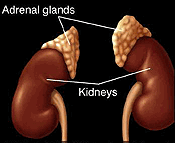Hypoglycemia Symptoms and Alternative Hypoglycemia Treatments
Low Blood Sugar or hypoglycemia symptoms typically worsen several hours after a meal. However, scientific studies now show that there’s much more to hypoglycemia symptoms and hypoglycemia treatments than just stabilizing blood sugar. The adrenal stress hormones, adrenalin and cortisol, are critically involved. In fact, most hypoglycemia symptoms are caused not by low blood sugar per se, but by an over-reaction of adrenalin and cortisol discharge—part of the body’s defense against blood sugar’s falling too low. A broad holistic approach to hypoglycemia treatments provides the best results.
Hypoglycemia symptoms are described and
alternative hypglycemia treatments are explained by Dr. King:
Potential Hypoglycemia Symptoms
- Feeling hungry or needing to eat very often
- Feeling anxious or nervous
- Feeling light headed or foggy
- Sweating, palpitations or rapid heart
- Chronic fatigue
- Poor sleep
- Anxiety and/or depression
- Feeling faint
- Hyperventilation or shortness of breath
- Overweight
If unusually severe, hypoglycemia symptoms can
also include fainting, epileptic seizures, or even a heart attack or a stroke.
However, don’t assume that hypoglycemia is the one or only cause of these
symptoms. Other forms of illness can be the main cause, with hypoglycemia
playing either no role at all, a minor but significant part, or as a major
exacerbating factor to any other physical or mental illness.
Diet-induced hypoglycemia symptoms versus hypoglycemia symptoms due to
Diabetes
Too much insulin or oral medicine for diabetes, can drive blood sugar
(glucose) down very low. This directly can causes hypoglycemia symptoms
Hypoglycemia treatments for a person with diabetes requires promptly taking
sugar, orally or by intravenous.
Dietary hypoglycemia symptoms trigger by a different, somewhat indirect path.
Normally, for people who don’t have hypoglycemia symptoms, blood sugar
(glucose) rises after a meal. Then the pancreatic hormone, insulin, kicks-in,
driving blood sugar back down. The low point or nadir of the blood sugar curve
occurs three or four hours after eating.
At the low blood sugar nadir, the adrenal glands fire-off modest amounts of
two anti-hypoglycemia hormones, adrenalin/epinephrine and cortisol. These
anti-hypoglycemia hormones, promptly drive blood sugar levels back up to the
level it was before you ate—in effect, a natural hypoglycemia treatment. No
hypoglycemia symptoms occur. Among people who are well, no further
hypoglycemia treatments are needed.
 People with diet-induced hypoglycemia, in contrast are hormonally-primed so
that their hypoglycemia-regulating hormones tend to over-react. Among people with
dietary hypoglycemia, as blood sugar rises after eating, the pancreas tends to
overshoot, firing too much of the blood-sugar lowering hormone, insulin.
This drives blood sugar down faster and further than it should. In response,
the adrenal glands somewhow "recognize" the need for an
emergency hypoglycemia treatment to block blood sugar from crashing. The body
reacts with a massive discharge of adrenalin and cortisol. Adrenalin and
cortisol do brake and then reverse, the falling blood sugar, but now, the
body’s anti-hypoglycemia treatment itself becomes the problem. In excess,
these “natural hormone” hypoglycemia treatments can cause a terrible range of
symptoms.
People with diet-induced hypoglycemia, in contrast are hormonally-primed so
that their hypoglycemia-regulating hormones tend to over-react. Among people with
dietary hypoglycemia, as blood sugar rises after eating, the pancreas tends to
overshoot, firing too much of the blood-sugar lowering hormone, insulin.
This drives blood sugar down faster and further than it should. In response,
the adrenal glands somewhow "recognize" the need for an
emergency hypoglycemia treatment to block blood sugar from crashing. The body
reacts with a massive discharge of adrenalin and cortisol. Adrenalin and
cortisol do brake and then reverse, the falling blood sugar, but now, the
body’s anti-hypoglycemia treatment itself becomes the problem. In excess,
these “natural hormone” hypoglycemia treatments can cause a terrible range of
symptoms.
Adrenalin/epinephrine, the “fight or flight” hormone, grossly over-stimulates,
causing “low blood sugar symptoms” of anxiety, rapid heart rate, foggy
thinking and fatigue. High cortisone, if frequent or prolonged, also mimics
low blood sugar symptoms, tending to make us fat, sluggish and depressed. So
for dietary hypoglycemia, most often, it’s not low blood sugar per se that
causes most of the symptoms. They’re primarily the side effects from too much
adrenalin and cortisol.
Researchers at the National Institutes of Health proved the critical role of
adrenalin and cortisol for hypoglycemia symptoms way back in 1984 publishing
in JAMA-- the Journal of the American Medical Association.
Top of Page (Hypoglycemia Treatments)
How to Diagnose Hypoglycemia Symptoms—the first step toward hypoglycemia
treatments
Suspect low blood sugar symptoms if any symptoms tend to get worse if your
meal is delayed, or if symptoms increase 3 to 4 hours after eating.
Suspect low blood sugar symptoms if symptoms worsen several hours after eating
a large amount of sugars, refined carbohydrates, caffeine alcohol or “junk”
food, and if you tend to improve after “cleaning up” your diet.
Suspect hypoglycemia symptoms if you feel a need to eat many times a day.
Suspect that low blood sugar symptoms may be part (not necessarily all) of the
problem if you are chronically tired or nervous or just not feeling well with
or without a clearly diagnosed illness.
Note: Almost any physical or mental health problem increases vulnerability to
hypoglycemia symptoms. Hypoglycemia symptoms, in turn, worsens physical and
mental illness. The result: a vicious cycle that helps keep people ill. Hence,
the importance of proper hypoglycemia treatments.
Hypoglycemia treatments, therefore, require attention, to:
Hypoglycemia diet treatment, while essential, are not enough just all by itself. |
Related Material of Interest

